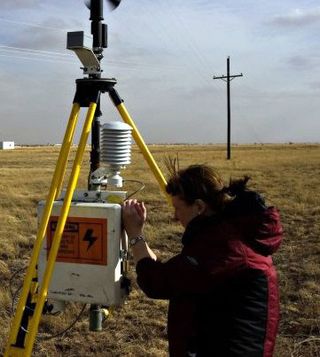More Than a Storm Chaser

This summer, the Verification of the Origins of Rotation in Tornadoes EXperiment 2 (VORTEX2) brought 80 scientists and crew members and dozens of research vehicles and platforms to the tornado-prone regions of the United States to conduct the most detailed studies to date of tornadoes. Sarah Dillingham was part of that effort, one of the members of Texas Tech’s Multiple Observations of Boundaries In the Local storm Environment (MOBILE) team, helping deploy StickNet mobile sensors in the paths of dangerous storms. VORTEX2 has wound down for the 2009 season, but will re-emerge in 2010. Dillingham offers her thoughts on her first yield of field research as she responds to the ScienceLives 10 Questions below. Also see the related Behind the Scenes feature by colleague Tanya Brown, along with ScienceLives profiles of Christopher Weiss (who heads the MOBILE team) and Ian Giammanco, and a Research in Action image from the VORTEX2 deployment featuring Ian and his colleague Frank Lombardo.
Name: Sarah Marie Dillingham Age: 25 Institution: Texas Tech University Field of Study: Atmospheric Science
What inspired you to choose this field of study? Like most, I've been fascinated with weather my entire life, and the fact that I get the chance to spend every day learning about and contributing to what I love means more than words can say.
What is the best piece of advice you ever received? Recently, friends and family have been joking with me about moving off to graduate school and doing bigger and better things, and most of them have had the same piece of advice for me: "Just remember that wherever you go and whatever you do, don't forget us little people." I usually laugh and reassure them that I won't, and I think that is a very good piece of advice for anyone. No matter who you become, you can't forget those special friends and family that supported you all along the way and were always there to offer their love.
What was your first scientific experiment as a child? As best as I can remember, I think it involved growing a lima bean or something simple like that. I never really was one of those kids that built volcanoes or anything really cool. I guess that's a little different than what I'm doing now with Vortex2, so clearly, I've evolved!
What is your favorite thing about being a researcher? With every new dataset we get, I have the opportunity to find some aspect of weather that no one has ever found before. On the other hand, maybe I'll just further prove something we've known for years. Either way, I have the chance to contribute something to further the field of meteorology and teach myself a thing or two.
What is the most important characteristic a researcher must demonstrate in order to be effective? A good, effective scientist should understand that even though you set out to change the world with your original work, you may not. It's the passion you have in order to keep going that ultimately makes all the difference in the world.
Sign up for the Live Science daily newsletter now
Get the world’s most fascinating discoveries delivered straight to your inbox.
What are the societal benefits of your research? Our research is providing vital information that could help understand why a tornado would form in one supercell, but not another, even though the two may look identical. Also, improved warning times can mean a lot to a family in the path of a tornado. Hopefully, through this project we can gain a better understanding of how to predict a tornado's occurrence, path or intensity and reduce the loss of life. The weather is one thing we can't really control, but we can do our best to prepare for what does occur.
Who has had the most influence on your thinking as a researcher? John Knox. He was my undergraduate advisor at the University of Georgia and got me involved in research early on in my career. His willingness to help and encouraging views helped me realize the true meaning behind research -- to learn and to use that knowledge to advance the science.
What about your field, or being a researcher, do you think would surprise people the most? Well, a lot of people seem to have the idea that we are all crazy storm chasers and constantly put ourselves in danger by trying to get too close. That's simply not the case; we are researchers. There may be some out for "the thrill of the hunt," but every new storm is a new chance for us to learn, even if we aren't always equipped with instruments. Just watching how a storm evolves can teach us something we may not have noticed before because no two storms are alike. We know where, when and how to best observe a storm without putting ourselves in danger -- that's what we're trained to do.
If you could only rescue one thing from your burning office or lab, what would it be? All the cards and pictures sent from my family back home. I always post the latest ones up on the wall in front of my desk. That way, I'm constantly reminded that they are always there for me to offer their unending love and support.
What music do you play most often in your lab or car? Kanye West, and maybe a little of the Twister soundtrack when I need a little inspiration, haha.
Most Popular

